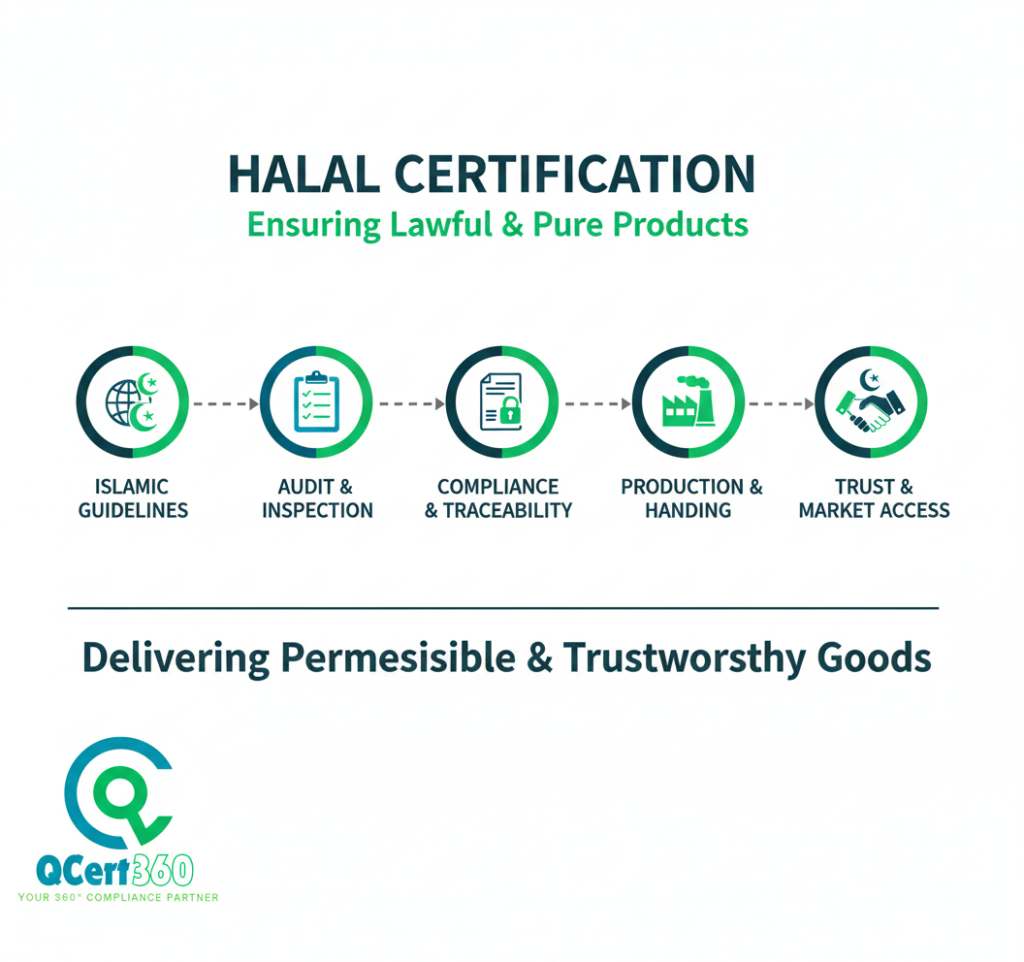HALAL Certification
Halal Certification is a process that verifies products and services comply with Islamic dietary laws and ethical standards. Applicable to food, beverages, pharmaceuticals, cosmetics, and logistics, it ensures that ingredients, production processes, storage, and handling are free from prohibited substances like pork, alcohol, or cross-contamination. The certification involves auditing suppliers, processing facilities, and supply chains to confirm compliance with Sharia principles. Halal Certification enhances consumer trust, expands market access in Muslim-majority countries, and demonstrates ethical and transparent practices. It is recognized globally, helping businesses meet regulatory requirements, cater to Muslim consumers, and strengthen brand credibility in international markets.
Request a Call Back
Get Free Consultation
Have any Questions?
Mail us Today!
contact@qcert360.com
HALAL Certification – Ensuring Compliance with Islamic Dietary Standards
For businesses in food, beverages, cosmetics, or pharmaceuticals, HALAL certification signals trust, quality, and compliance. It confirms that products meet Islamic dietary and ethical standards, assuring Muslim consumers that ingredients, processing, and handling are permissible and hygienic. Beyond regulatory adherence, HALAL certification demonstrates a company’s commitment to integrity, safety, and ethical production practices. It also opens doors to global markets, especially in Muslim-majority countries, enhancing brand credibility and consumer confidence. By obtaining HALAL certification, businesses not only meet religious requirements but also strengthen their reputation, ensure product safety, and gain a competitive edge in international trade.
What is HALAL Certification?
HALAL certification confirms that products comply with Islamic laws, covering ingredients, processing methods, hygiene, storage, and handling practices. This includes ensuring that no prohibited (haram) substances are used, and that products are prepared in a way that is clean, safe, and ethically acceptable.
HALAL certification applies across industries including food and beverages, pharmaceuticals, cosmetics, personal care, and logistics services. By obtaining certification, companies can access Muslim-majority markets and strengthen their brand credibility globally.
Why HALAL Certification Matters for your product
HALAL certification is more than a regulatory or religious formality—it’s a strategic advantage for businesses. It ensures:
- Market Access – Opens doors to Muslim-majority countries and regions where HALAL compliance is mandatory for trade.
- Consumer Confidence – Gives customers assurance that products meet strict religious, ethical, and dietary requirements.
- Quality Assurance – Encourages hygiene, safety, and ethical sourcing across production and supply chains.
- Global Trade – Recognized internationally, HALAL certification facilitates smoother exports and acceptance in diverse markets.
- Business Credibility – Strengthens reputation with consumers, distributors, and regulatory authorities, signaling commitment to integrity, safety, and ethical practices.
By achieving HALAL certification, companies not only comply with religious standards but also reinforce trust, improve product quality, and expand their global reach.

Benefits:
Enhanced Marketability:
Obtaining certification boosts brand visibility and credibility, making products and services more attractive to consumers and increasing market share in global markets.
Consumer Trust & Satisfaction:
Certification assure customers of consistent quality, safety, and reliability, fostering trust, increasing brand loyalty, and ensuring higher levels of customer satisfaction.
Regulatory Compliance
Certification ensure compliance with global standards and regulations, helping businesses avoid legal issues, penalties, and enabling smoother entry into diverse international markets.
Competitive Advantage
Holding certification distinguishes a business from competitors, signaling superior quality and reliability, and positioning the company as an industry leader in the market.
Global Expansion
Certification provide access to new international markets, demonstrating that a business meets global standards, which facilitates expansion and opens doors to new business opportunities worldwide.
Risk Mitigation & Efficiency
Certifications help identify and mitigate risks, streamline operations, and reduce errors or defects, ensuring efficiency and consistency while safeguarding against operational disruptions.
Core Components of HALAL Certification
HALAL certification involves a structured approach to ensure products fully comply with Islamic dietary and ethical standards:
- Ingredient Verification – Confirming that all raw materials and additives are permissible (halal) and free from prohibited substances (haram).
- Production Process Compliance – Implementing strict procedures to prevent cross-contamination, including separate equipment, hygienic handling, and controlled workflows.
- Storage and Transportation – Ensuring halal integrity is maintained throughout the supply chain, from warehousing to delivery, with proper segregation and labeling.
- Documentation – Maintaining detailed records of sourcing, production, processing, and handling to demonstrate compliance during audits and inspections.
- Continuous Monitoring – Regular internal checks and audits to verify adherence to halal standards and identify improvement opportunities.
By following these core components, organizations can consistently deliver halal-compliant products, building consumer trust and meeting both regulatory and market expectations.
Benefits of HALAL Certification
Achieving HALAL certification offers significant advantages for businesses seeking to expand and strengthen their market presence:
- Global Market Access – Opens doors to the growing Muslim consumer base across the Middle East, Southeast Asia, and other halal-sensitive regions.
- Enhanced Brand Reputation – Positions your company as a trustworthy, ethical, and socially responsible producer.
- Consumer Trust and Loyalty – Provides assurance to customers that products comply with religious and ethical standards, fostering repeat purchases and long-term loyalty.
- Regulatory Compliance – Ensures adherence to export requirements and market-specific halal regulations, reducing legal risks and facilitating smooth trade.
- Competitive Advantage – Differentiates certified products from non-certified alternatives, boosting appeal in both domestic and international markets.
- Market Credibility – Signals commitment to quality, hygiene, and ethical practices, helping attract distributors, retailers, and institutional buyers.
By integrating HALAL standards, businesses not only meet compliance requirements but also strengthen their brand, enhance customer confidence, and position themselves for sustainable growth in global halal markets.
Who Needs HALAL Certification?
HALAL certification is essential for any organization producing, handling, or distributing products intended for Muslim consumers. Key stakeholders include:
- Food and Beverage Manufacturers – Companies producing processed foods, snacks, beverages, and raw ingredients that must meet halal standards.
- Pharmaceutical and Cosmetic Companies – Producers of medicines, supplements, skincare, and personal care products seeking to assure halal compliance.
- Distributors and Exporters – Businesses supplying halal-compliant products across borders, ensuring adherence to international halal regulations.
- Logistics and Packaging Providers – Firms responsible for storage, transport, and packaging, maintaining segregation and halal integrity throughout the supply chain.
Essentially, any organization aiming to access halal-sensitive markets, build consumer trust, and demonstrate compliance with Islamic dietary and ethical requirements benefits from HALAL certification. It’s a mark of reliability, quality, and respect for cultural and religious standards.
Ongoing Compliance Under HALAL certification
Maintaining HALAL certification is an ongoing responsibility that goes beyond initial approval. Organizations must:
Conduct Regular Audits and Inspections – Verify that production, handling, and storage consistently meet halal standards.
Train Staff Continuously – Ensure employees understand proper halal procedures, hygiene protocols, and segregation practices.
Update Processes and Suppliers – Adapt to changes in ingredients, suppliers, or production methods while preserving halal integrity.
Monitor Regulatory Changes – Stay informed on evolving halal regulations and requirements in key domestic and international markets.
By embedding these practices into daily operations, businesses maintain consumer confidence, secure continued access to halal-sensitive markets, and demonstrate a sustained commitment to ethical, safe, and culturally compliant products.
Conclusion: Qcert360 Expertise in getting your product HALAL certified
Achieving HALAL certification requires more than a checklist—it demands technical expertise, strict process control, and meticulous documentation. At Qcert360, we support organizations at every stage of the certification journey, from ingredient verification and production audits to record-keeping, staff training, and overall certification readiness.
By partnering with Qcert360, businesses gain assurance that their products consistently meet global HALAL standards, ensuring integrity across sourcing, manufacturing, and supply chains. Our guidance helps companies build credibility, strengthen consumer trust, and expand into Muslim-majority and halal-conscious international markets.
Beyond compliance, Qcert360 emphasizes sustainable practices, ethical production, and quality management, giving organizations a competitive edge. With our expertise, your business not only secures certification but also demonstrates a genuine commitment to quality, safety, and ethical responsibility, positioning your brand for long-term growth and recognition in the rapidly expanding global HALAL market.
Sectors & Industries we serve
Our Services
ISO Standards
- ISO 9001 Certification
- ISO 14001 Certification
- ISO 45001 Certification
- ISO 22000 Certification
- ISO 17025 Certification
- ISO 27001 Certification
- ISO 13485 Certification
- ISO 20000-1 Certification
- ISO 41001 Certification
- ISO 22716 Certification
- ISO 50001 Certification
- ISO 22301 Certification
- ISO 29993 Certification
Product Certifications
Other international standards
- FSSC 22000 Certification
- HIPAA
- HACCP Certification
- SA 8000 Certification
- GMP Certification
- GDPR
- GDP Certification
- GLP Certification
- Certificate of Conformity


